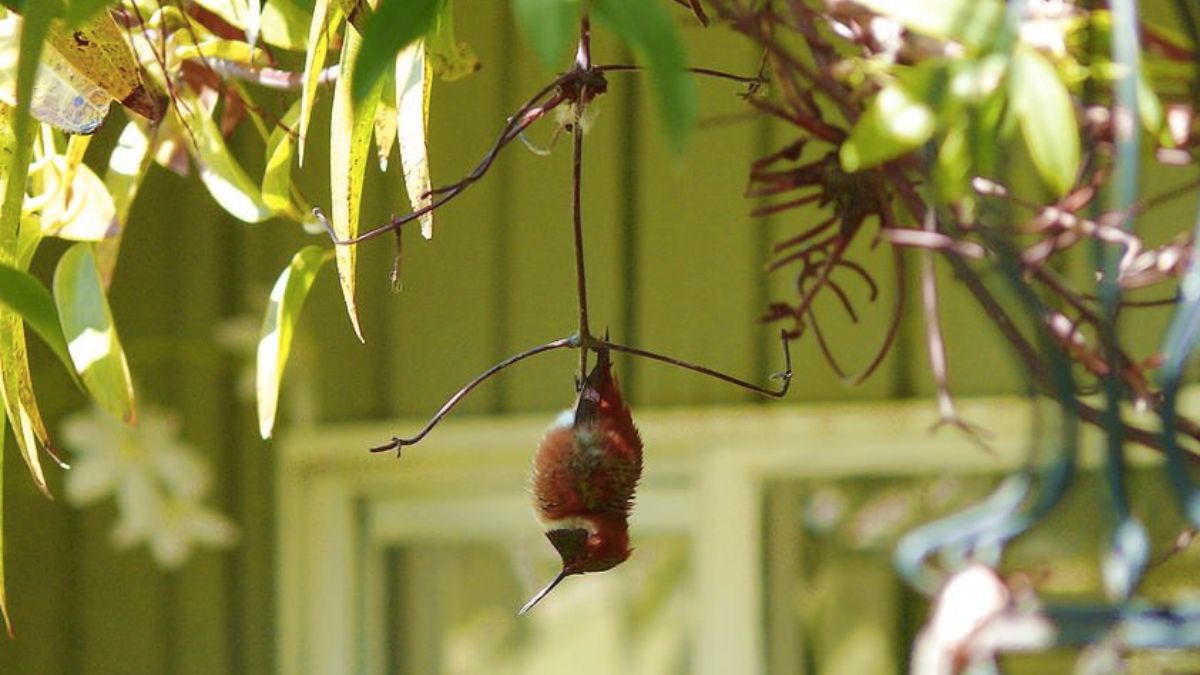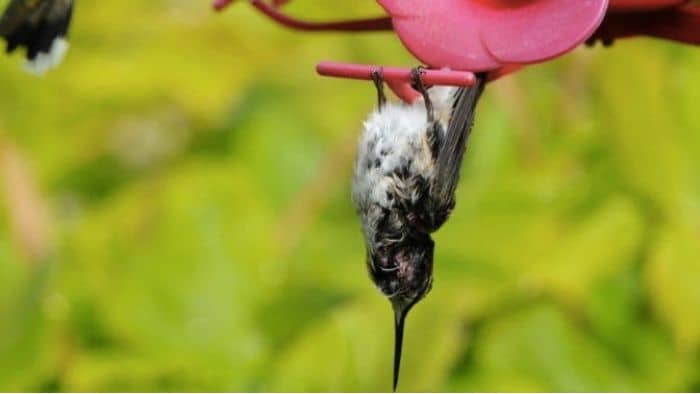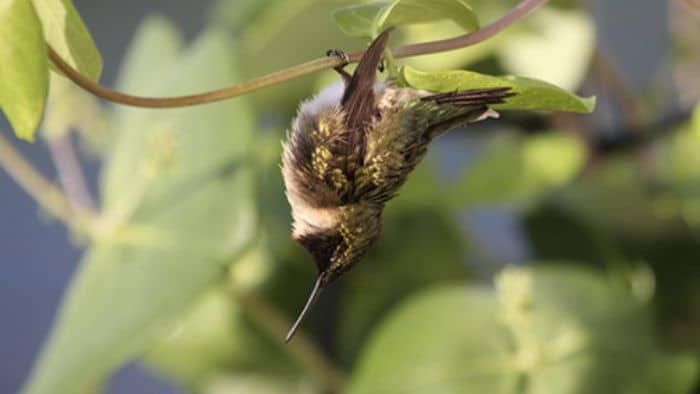Last Updated on August 3, 2022 by Guillermina
Why do hummingbirds hang upside down? Find out all the interesting things about their sleep schedule.
Hummingbirds are beautiful little creatures known for their fast flight. Did you know that wings beat an average of 10 to 15 times in just one second? There’s even a record of one specimen flapping its wings an incredible 80 times per second. When you consider all the effort they put in, it’s no wonder they get very tired at the end of the day.
We recently heard an interesting question: why do hummingbirds hang upside down? That is why we are here today to solve this great enigma. Stay with us and find out anything you might be interested in about their sleep.
Why Do Hummingbirds Hang Upside Down?
Like every other animal in this world, hummingbirds feel the need to sleep. However, keep in mind that their sleep is very different from the sleep of other animals, and this is because they have an incredibly high metabolic rate. So, why do hummingbirds hang upside down? Well, that’s why there is one characteristic reason named torpor, find out more about it below.
What Is Torpor?
So, the only logical answer to the question “why do hummingbirds hang upside down” is torpor. It is basically a state of hibernation that starts every night when they go to sleep. Due to their incredibly fast metabolism, these birds need a constant supply of energy. However, as you may have guessed, they can’t replenish energy while they sleep, so Mother Nature took care of that.
Namely, by their nature, these birds can slow down their metabolism while they sleep and speed it up again with the first rays of the sun. How is that even possible? They simply slow down their metabolism by significantly slowing down their heart rate and respiration as well as body temperature.
What we need to put special emphasis on is that during the night the body temperature of this bird is in a significant drop, which actually means that hummingbirds stay warm just enough to maintain normal body functions. We especially like how they carefully arrange their feathers to keep them warm enough.
In the next few sentences, you will get a few more little details about why do hummingbirds hang upside down. When in a state of torpor, the hummingbirds will quite frequently hang upside down, and they do so primarily because in this way they consume no energy other than that which they need to ensure that they do not fall down.
People who have seen a hummingbird in this condition often claim that the bird looked completely dead to them. Do you know what is most amazing? When the hummer is in a state of torpor, it is very likely that it will not move even if you touch it with your hand.
Are There Any Exceptions?
As with everything else, there are indeed some exceptions when it comes to the dream of these dazzling creatures.
In some areas where there may be plenty of unnatural light such as balconies, verandas, and porches, hummingbirds may continue to feed long into the night unaware that it is long overdue to sleep. This most often happens during warmer weather.
Furthermore, during a migration in which hummingbirds cross the Gulf of Mexico, the flight can last up to 20 hours without a suitable resting place. Hummingbirds will therefore fly until they complete the campaign and then sleep until they make up for the lost time.
Where Do Hummingbirds Most Often Sleep?
Hummingbirds usually sleep on the branch or twig of a tree, preferring to sleep sheltered by trees to be safe from predators and bad weather. They usually choose trees with spaced branches such as oak or birch because their characteristic leaves make it easier to hide.
It is no wonder that they always choose enclosed space, as in this way they protect themselves from predators, and in addition, it is much easier to go into a state of torpor. If they decide to take a nap outdoors, they will mostly choose places like wire or nectar feeders.
Why Do Hummingbirds Hang Upside Down? Final Verdict
Although this is not their completely natural sleeping position, these birds do sleep upside down. The main culprit for this is their fast metabolism which can deplete all their energy while they sleep.
This is why hummingbirds enter a state of torpor during the night in which they slow down their metabolism by significantly slowing down their heart rate and respiration as well as body temperature. Once they find a suitable place, their toes close tightly around their perch. We know it looks alarming, but it is harmless and completely natural!
Did you know why do hummingbirds hang upside down? Write to us in the section below.
Read more Can Hummingbirds Survive Cold Weather? No. 1 Method To Help These Amazing Creatures
FAQ’s
What Does It Mean When A Hummingbird Hangs Upside Down?
If you notice a hummingbird hanging upside down, it is probably not dead but in a state of torpor. It is a state of hibernation that starts every night when they go to sleep. Hummingbirds use this condition to conserve energy until the morning when they can feed again.
How Long Does Hummingbird Torpor Last?
The length of the torpor varies, and can almost never be predicted. However, according to research, this condition can last anywhere from five to ten hours.
How Can You Tell If A Hummingbird Is In Torpor Or Dead?
It is very difficult to distinguish whether a hummingbird is dead or in a state of torpor, so without careful observation, you will not be able to determine anything.
Do Hummingbirds Sleep In The Same Place Every Night?
If they feel safe enough and have enough food sources, it is very likely that these birds will return to the same place every night to spend the night.



